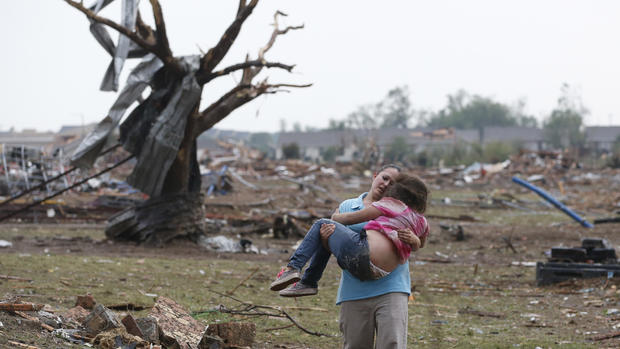When preparing for disaster like Okla. tornado, remember your pets
Disasters like the Oklahoma tornado cannot be avoided, but preparations can be made to try to ensure the safety of your family and loved ones in case of an emergency. While we often stock up on supplies for people, sometimes we forget that our pets have items that they too can't go without.
"Preparedness is peace of mind," Dr. Heather Case, director of the scientific activities division of the American Veterinary Medical Association, told CBSNews.com. "Obviously it's too late for Oklahoma victims, but there are lessons that others can learn because we are at the beginning of this (tornado) season. Thinking ahead is certainly helpful."
Any pet owner's emergency kit should contain an adequate supply of water, food and any necessary medications for their pets. Ideally, there should be enough supplies to last two weeks. Treats and toys are also good to have on hand, and water and food bowls, litter pans, cat litter and garbage bags for waste should be included. Also, don't forget to pack a can opener to open those wet food cans.
You should also keep your pet up to date on its vaccinations and have a copies of their records, as well as the veterinarian's number, in your kit. This will also facilitate entrance into an animal shelter that your pet may need to stay at, since many emergency shelters for people will not allow animals.
Make sure you have carriers that fit your dog or cat, and make sure they are comfortable riding in them. If you have larger animals, such as livestock or horses, work with your community to ensure there are enough trailers to move them to safe areas during a disaster.
Know basic first-aid, but if your pet needs further assistant, contact a trained professional. Dr. Bruce Kornreich, associate director for education and outreach at Cornell's Feline Health Center in Ithaca, N.Y., said that trying to medicate your pet with human drugs may lead to accidental poisoning. For example, Tylenol, while helpful for pain in humans, is fatal to cats, he said.
When you create your family's evacuation plan, make sure that you seek input from you veterinarian as well, who can tell you about facilities that are available for your dog or cat in the area. Be aware of any 24-hour emergency room clinics for pets as well.
There's also a possibility that you won't be at home when an emergency happens -- but your pet will be. Kornreich suggested a buddy system with a neighbor or family member can help in this situation. Make sure that neighbor has a copy of your pet's veterinary records, a presigned letter that releases your friend from responsibility from injury and a presigned letter that grants them treatment authorization. This way, veterinary centers will have no problem giving your pet treatment if you, the owner, are not physically around.
Another problem owners should plan for is when a pet might get separated from the family during a disaster.
"A major problem is that a lot of pets don't end up finding their homes quickly because they're not identified," Kornreich cautioned. "This one is a perfect example. These people never expected that their houses would be destroyed, and the animals could get out."
Pets should always have a collar with your phone number so people can contact you if they find them. But, cell phone towers may have been knocked down, rendering your personal line useless. If there is space, put the phone number of a person who is out of the area who would be able to get a hold of you or send a message to you during an emergency, Case said.
But, collars may slip off. Microchipping, or placing a small computer chip that contains your contact information under the pet's skin, can be invaluable. Dr. Jessi Cullen, a senior emergency clinician with Blue Pearl Veterinary Partners in Virginia Beach, Va., said implanting the chip is an outpatient procedure that can be done when the pet is getting a vaccine. While it might sting a little bit when they get the shot, pets don't even know it's there, she assured. Cullen herself had her microchipped cat returned to her five years after it went missing, so she's a firm believer.
If you see an abandoned pet on the road, don't approach it and try to help. Instead contact local authorities who are trained to care for animals in disasters. Pets may not have rabies vaccinations and may be stressed and react negatively.
"They can be lost and disoriented, and an animal that otherwise would never attack may do so," Cullen warned. "You don't want to get bit by a dog that doesn't have a current rabies shot."
Case pointed out that after Hurricane Katrina, the government passed the Pet Evacuation Transportation Standards (PETS) act, a Stafford act that allows communities to get reimbursement for animal rescue during emergencies. As a result, many areas have established state animal response teams and trained professional individuals to respond to pets' needs.
For further information, the American Veterinary Medical Association (AVMA)has resources on how to prepare your pet for a disaster.
"You kind of have to treat your pet like a family member, which we hope everyone does anyway," Cullen said.
